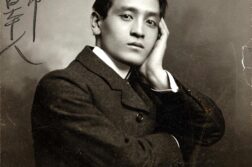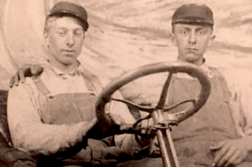“That a woman, unwriting herself, flooding the world with her details, standing in such an endangered place, could be free.”
— Eileen Myles, “The Lesbian Poet” (a talk given at St. Mark’s Poetry Project in New York’s East Village)
WHEN EILEEN MYLES speaks of “unwriting” herself, she means letting go of socially imposed elements of her identity and behavior in order to clear a space where she can live in the world on her own terms. Her work not only joyfully and unapologetically proclaims her own authenticity, but also strives to claim a place for this authentic being in the public sphere. She celebrates her unique perspective as a woman, a lesbian, and a child of the working class—and boldly forges a place for this perspective in the institutional mainstream. Even though her identity is viewed as a transgression against the institutions that raised her, Myles refuses either to conform or to be shut out. Through her writing, she re-inhabits these institutions in her own way and ultimately makes their denizens take notice of her presence.
Myles describes the foundation of her writing as radical self-trust: “If anything, my work is about … taking your time and taking your space and telling it your way.” For Myles, “telling it your way” partly means creating her own genre to write about herself. We see this innovation at work in Cool for You (Soft Skull Press, 2000), which Myles terms a “nonfiction novel,” an invented genre that allows her the freedom she needs to define herself. Her first prose work, a collection of short stories called Chelsea Girls (Black Sparrow, 1997), she describes as “autobiographical fiction.” Classifying these works as fiction allows Myles to tell her life story as she wants it to be told, as facts re-imagined in the present. Myles’ writing style is marked by a unique voice that merges informality and intimacy with lyricism and wisdom. In an interview with Talisman, she mentioned that all of her peers back home were trying to “lose their accents,” something she actively resisted doing. In her writing, Myles often uses incorrect grammar, such as “her and I” and “most softest,” refusing to adopt the language of the privileged to speak about herself. Her autobiography also combines poetry and prose, fiction and nonfiction, linear retellings of events with fragmented thoughts about them.
In her personal life, Myles likewise rejects the conventions that her family and community would impose. Much of this rebellion is played out through questions of gender. Myles identifies as a butch lesbian, but once remarked that “[t]he whole world was a plot to turn me into a femme.” In Cool for You, she describes her mother’s efforts to feminize her by sending her to ballet class. Instead, she used the class as a way to exercise her male tendencies. (She actually loves ballet because it lets her feel her “strength” and teaches her how “unbreakable” she is.) After Myles realized that she wouldn’t be permitted to assume the masculine role in partner dancing but would instead have to be twirled by a man, she quit the class. At family dinners throughout her childhood, Myles evaded the “boring” world of girldom by hiding under the table, where she could be “neither boy nor girl.” Neither role appealed to her: “women had to pretend to like each other,” while the men “had to pretend to work.”
What Myles rebelled against in particular was the idea that “everything a girl did was supposed to be good.” In Chelsea Girls and Cool for You, she talks almost exclusively about her “screwing up”: having affairs with married couples, shamelessly stealing, spending her last five bucks on cigarettes and beer. On the first page of Cool for You, she describes herself as “a girl and a fuck-up.” This is a source of pride for Myles because she’s being female on her own terms. She refuses to sink quietly into the pattern she observes in female lives: “women wind up in little rooms, women wind up alone.” In her writing she often slips seamlessly between thinking of herself as a woman and as a man.
Myles reveals much about her “abnormality” through her relationship to sex. Often what she describes as sexy would not ordinarily be considered as such, while her actual sexual experiences—or at least the ones she chooses to describe—are often far from sexy. Her encounter with Leon, an older man she met at a bar, is even described as a “sin.” The sin lies in the fact that she was “obedient to the situation,” doing as Leon said despite her own desires and thus sinning against herself. But if a real eroticism was missing from these early sexual encounters, Myles uses explicitly sexual language when recalling both family interactions and literary encounters: “My brother and I aroused each other verbally for years. In my family we talk a hot fuck.” Myles describes her parents reading aloud to their children as “the first erotic literature.”
Myles often addresses the reader directly and demands an intimate engagement with her tale. On the first page of Cool for You—note the “for you”—she writes: “I know I’ve told you this before but I’m lonely tonight and it’s raining out.” In other words: You will listen to me and you will like it! The book is all about Myles, to be sure, but its value lies in the fact that “you” are reading it and thus enabling her voice to be heard. “There. I’ve gotten to explain it,” she writes in Chelsea Girls as she winds up an explanation for an unusual thought. Without “your” understanding, Myles is speaking into a void and her authenticity is wasted.
It is by virtue of her uniqueness, the fact that she’s not “normal” by conventional standards, that Myles feels empowered to claim a right to be heard. She credits the repressions of her childhood with her need to communicate who she really is. There is a sense of urgency to much of her work, as if she’s standing somewhere just beyond the text, shrieking, “Listen to me!” “Because I have spent my life within the walls of institutions … I continuously shoot my wad, make my own inappropriate nature vividly plain, endlessly expose the full dose of my abnormality when presented with any simple request to fill out a form that has longer than a one-line blank.” Writing is a constant coming-out for Myles, not just in terms of her sexuality, but in terms of her full identity.
The need to reveal who she is in her entirety is partly explained by Myles’ fear of erasure: “There was something about my particular life—as a female, as a person prone to drug and alcohol abuse, as a lesbian—that I sensed was endangered.” This sense of life in danger of being forgotten and therefore in need of documentation is elaborated through the story of Myles’ grandmother Nellie, to whom Cool for You is dedicated and who comes up repeatedly in the book. All that’s left of Nellie, who spent the last seventeen years of her life at Westborough [Massachusetts] State Hospital, are incomplete and inaccurate hospital documents, which include nothing of her personality. Myles wants to record the details of her own life and thoughts so that she won’t meet a similar fate. Myles learns from her grandmother’s life that “the State tells the epic of the people’s lives, putting people on the scale, weighing the wrong things, then acting ponderous about the misinformation.”
Myles’ desire to make herself known operates in the structure of Cool for You, which revolves around the many institutions that shaped her early years: home and family, Catholic school, the state of Massachusetts, the mental institute where she worked. Her urge to “sing her heart out” emerges in Cool for You as a literal way of claiming a place for her personal identity within all those institutions that sought to homogenize everyone. Myles describes her very first day of school: “I gulped in some air and made a big chest … and sailed into the schoolyard singing my heart out. … How can they stand it, I wondered—my power?”
While working at the mental institute, she was afraid of eating “their” food—the food mass-produced for the patients. The thought that “you might wind up eating it one day, looking around, the day you forgot who you were” produces a real horror in her. Although she doesn’t divorce herself from institutions, she feels a strong need to preserve her individuality within them, so as not become one of the patients, who all eat the same things, wear the same clothes, follow the same schedule. Loss of personal identity is Myles’ special terror. She describes a particularly hard day: “I had been empty of me. I didn’t want that.”
Myles also situates herself within the Catholic school system in unconventional ways by writing of her misbehavior in school—for example, by drumming loudly on the desktop with her fingers while the nun taught class, and producing a sound that gave her real joy: “It felt like your whole body got released in this place.” Not only does Myles use language suggestive of orgasm—release—to describe a part of her Catholic school experience, but she also commits behavior typically considered masculine: the nun in charge of the class demands to know “what boy” is making that drumming noise. Myles transgresses both by appreciating sensuality and by stepping outside of prescribed gender roles. However, by writing about this incident of being punished for her eccentric behavior, she turns a dishonorable transgression into an act of defiance. Despite the world’s best efforts, she refused to stop being herself.
Myles found herself greatly at odds with her family, as well: “It was like traveling in a foreign country, growing up in my family.” She speaks specifically of the embarrassment of not understanding adult language. Immediately after relating a particularly humiliating misunderstanding, Myles writes: “Forty years later I’m reading poems in a large café in Santa Fe.” This juxtaposition signals the fact that Myles has reclaimed language. She now writes of her childhood misunderstandings with her family members in her own language, exposing both the unfairness of these situations and her unique way of thinking about them. As a child, Myles writes, “No one saw me straight on.” Now they have to, she implies again and again in her writing.
By defining herself within institutions, Myles re-imagines these institutions and asserts her own place within them, albeit an unconventional place. Her experience as a counselor at summer camp, for instance, is all about stealing food and coming to terms with her homosexuality, not the campfire chats and swimming lessons we typically associate with the job. She writes not of comforting children from nightmares but rather of lusting after one of them. Myles wants to be a part of the public sphere, but only on her own terms. Her writing exposes the repressiveness of these institutions, but, despite a few instances of bitterness, she never proposes abandoning them. Instead, she calls attention to the repression she felt there to show how far she has come—how headstrong and firm in her own identity she had to be to reject the message that she “was a worthless little animal.” In one interview she specifically highlighted the early attempts to silence her: “[Y]ou’re really taught in the kind of catholic school education I had that you’re not something special: ‘We don’t want to hear from you.’”
Writing, then, became an affirmation for Myles that she was someone whose story deserved to be told. Cool for You chronicles her journey toward a belief in the importance of her own life’s details and her own thoughts—a belief that’s both fueled by, and necessary for, her birth as a writer. “Why can’t I record everything down like my life counts, like I’m the Queen of England or Bobby Vee, and that way I can be safe and not have to wait to die to be important. … Because I am not rich, I am not a saint.” We realize, of course, that ultimately Myles has recorded her own life, but she wants us to be aware of what she had to go through to be empowered to do that. In Chelsea Girls and Cool for You, she repeatedly invokes the grief and confusion of the time “before I really knew I was anybody at all.” This is clearly contrasted with her strong sense of self after emerging as a poet in the public sphere: “I read with Joe Ceravolo in 1971 and I read my love poems to a woman, Rose, and it seemed that I was everything, all at once, after that,” Myles proclaims in “The Lesbian Poet.” Cool for You reveals that Rose was the first woman with whom she admitted to being in love. Thus she came out as a lesbian and as a poet at the same time: her emergence as a recognized writer coincided with her owning the totality of her identity in a public space.
From her earliest years, literature represented for Myles a place where she could be fully herself. The first place that she felt really at home was in the library: “it was free and it was quiet and I belonged.” Writing for Myles is about creating the life she has always wanted for herself—not only as a poet but as the person whose life is portrayed on the page. “I was living a life that I wrote, all these disappointing and confusing things would be perceived in a book, one that was read, and then it would be okay, the world I was in.” The life one leads, however chaotic and incomprehensible at the time, can be understood and even justified when converted into art and shared with others. Such a life indeed becomes grist for the poetic mill if only one pays attention to it.
In the story “Light Warrior” in Chelsea Girls, Myles writes: “I am a significant person, maybe a saint, or larger than life.” She ultimately claims a place for herself as a hero by changing the parameters of the heroic: “Poet has always meant to me saint or hero.” Myles’ approach to achieving this self-defined sainthood is to build an identity based on her position as an outsider, as someone rejected by polite society: “I began to take up residence in my poems, saw my life as a loser’s, hence poetic.” During her adolescence, recounts Myles, “I was not normal, this was my pain.”
Myles’ penchant for turning the ugly or miserable into something alluring or even beautiful is present in her many casual observations about life and death: “Dying is sexy. … There is no place better in the world than the bedside of a friend who’s dying.” She similarly sees a young man in a mental institute, alone and “rocking slightly forward again and again. It seemed like he was in rhythm with every little thing there was.” Just as Myles finds poetry in her own sense of isolation, she often finds beauty in circumstances that are typically considered depressing or meaningless. Both Chelsea Girls and Cool for You are testaments to Myles’ ability, as Greg Masters writes, to “dredge some value out of the muck of ordinary youthful experience.”
In “Popponesset,” Myles describes a drunken night in high school that ends with her being gang-banged. In the morning, she goes to the beach alone and writes her name in the sand: “eileen myles. Yes, that’s who I am.” Through her writing, Myles is constantly reminding herself and others of her distinct existence, so that the horror and the ugliness being observed do not become her. Furthermore, by giving voice to this horrific crime, Myles proposes that poetry can serve as an antidote to it.
This story from Chelsea Girls is a good illustration of the cheerfulness that Myles sustains even when speaking of difficult or repellant things, such as her father’s alcoholism or her teenage depression. Thus even when the topic is downbeat, her project is a hopeful one as she joyfully takes her place in the world. Noah de Lissovoy put it this way in Talisman: “Her writing points to the barriers, occupying them and re-imagining them into an opening.” She highlights the sadness of her aunt Anne’s funeral, where no one in the family would speak except for the boyfriend of one of the grandchildren. Myles ends the scene triumphant nevertheless: “I want to get up there, I whispered to my mother. Don’t you dare, she whispered back. Mom, I speak.” Through her writing, Myles finds an alternative way to speak at the funeral—and all the other places where she’s been told to remain silent.
“My pain made me sing.” Myles describes art as her “one kind of power.” It has allowed her to forge a place for herself—one that she can accept and be grateful for—within the institutions that tried to stifle her into anonymity. In the last paragraph of Cool for You, Myles again calls our attention to her intimacy with institutions of various kinds: “I’d like to thank the state of Massachusetts.” She will not relinquish her claim to a place in all these institutions, even though her identity is defined precisely in opposition to them, as their antithesis. Instead of abandoning or condemning the world that tells her she doesn’t belong, Myles pays attention to it and rewrites it, with herself at its center.
Hannah Tennant-Moore, a recent graduate of Wesleyan, is a full-time freelance writer and winner of Turning Wheel’s Young Writers Award.






Discussion1 Comment
Pingback: Eileen Myles, a Critical Bibliography – A Collective History of American Poetry and Poetics